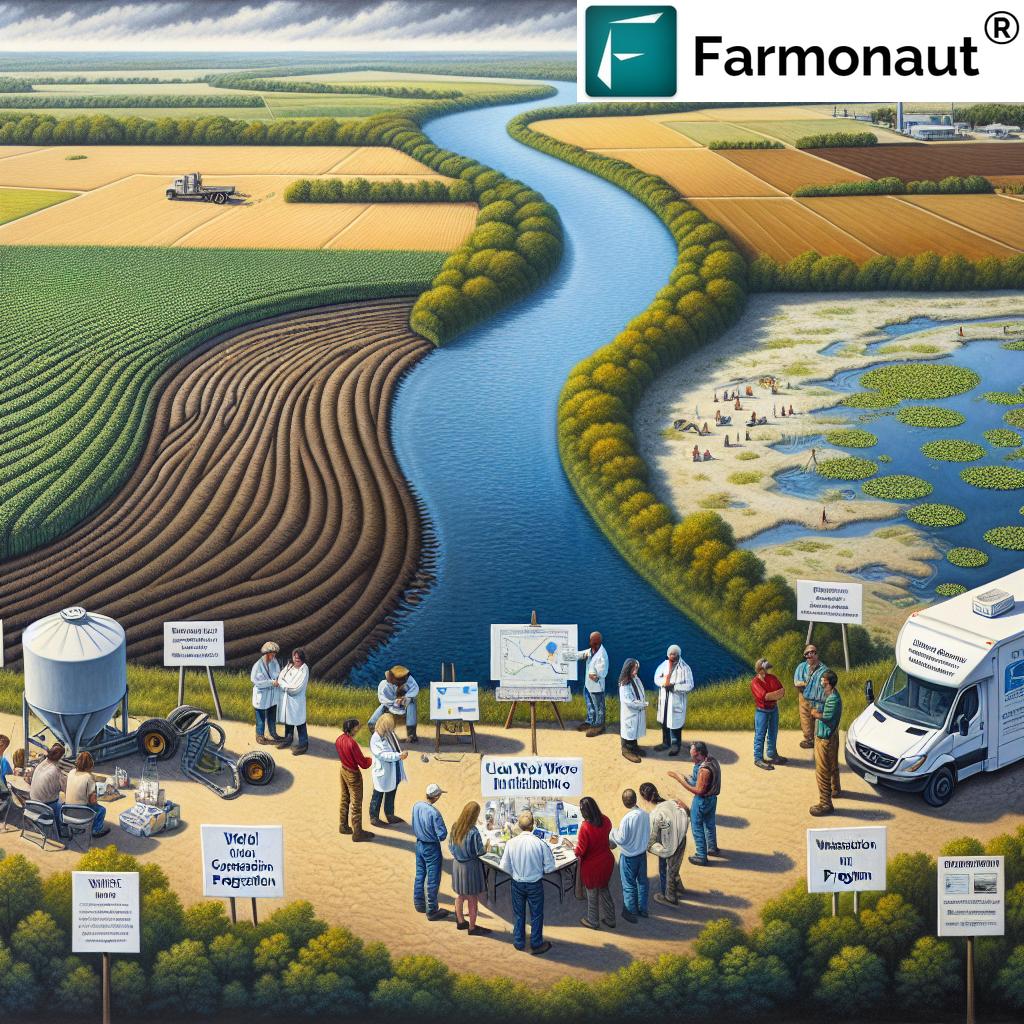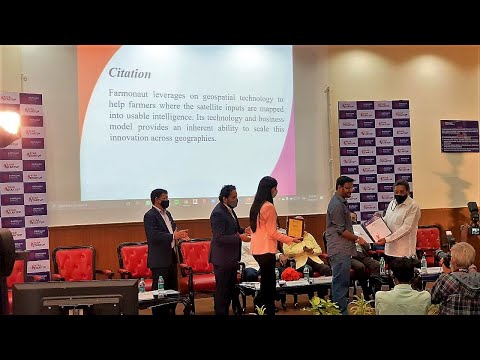Farmonaut: Revolutionizing Wisconsin’s Clean Water Initiatives for Safe Drinking and Sustainable Agriculture
“Wisconsin’s PFAS contamination crisis affects over 1 million residents, highlighting the urgency of clean water initiatives.”
In the heart of America’s Dairyland, a crisis is brewing – one that threatens the very essence of life and livelihood for millions of Wisconsinites. As we at Farmonaut delve into the complex web of challenges surrounding safe drinking water in Wisconsin, we find ourselves at the intersection of public health, environmental sustainability, and agricultural prosperity. Our mission to revolutionize farming through technology takes on new significance as we explore how our innovative solutions can contribute to the state’s clean water initiatives.
The PFAS Predicament: A Threat to Wisconsin’s Water
Per- and polyfluoroalkyl substances, commonly known as PFAS, have emerged as a formidable adversary in Wisconsin’s fight for clean water. These persistent chemicals, once hailed for their remarkable properties in various industrial and consumer products, now cast a long shadow over the state’s water resources. The contamination is not just a fleeting concern; it’s a critical health issue that demands immediate and sustained attention.
Governor Tony Evers has placed the safe drinking water initiative at the forefront of his administration’s agenda. His proposed biennial budget includes a substantial $145 million investment specifically targeted at combating PFAS issues and improving overall water quality. This commitment reflects the urgency of the situation and the need for comprehensive measures to protect Wisconsin’s residents and natural resources.

The Scope of the Challenge: From Urban Centers to Rural Communities
The impact of PFAS contamination in Wisconsin is far-reaching, affecting both urban and rural areas. In Marinette County, residents like Cindy Boyle have been grappling with the consequences of PFAS pollution for years. The situation in Marinette exemplifies the broader crisis, where toxic plumes have infiltrated groundwater, contaminating wells and forcing residents to rely on filtration systems in their homes.
But the challenge extends beyond individual households. Agricultural industries, a cornerstone of Wisconsin’s economy, face the dual challenge of maintaining productivity while adapting to stricter water quality standards. As we at Farmonaut understand the critical role of water in agriculture, we recognize the potential for our satellite-based farm management solutions to contribute to more sustainable farming practices that can help mitigate water contamination risks.
Legislative Landscape: Navigating the Waters of Policy and Action
The path to clean water in Wisconsin is paved with legislative initiatives and political debates. Governor Evers’ proposal to expand the state’s Well Compensation Program and implement the Chemical Level Enforcement of Remediation (CLEAR) Act represents a significant step towards enshrining PFAS standards in law. However, the journey from proposal to enacted legislation is fraught with challenges.
The REINS Act, which requires legislative approval for expenditures exceeding $10 million, has become a point of contention. State Rep. David Steffen and other Republicans have raised concerns about the governor’s intention to exempt parts of the budget from this act, highlighting the complex interplay between fiscal responsibility and urgent environmental action.
The Role of Technology in Water Quality Management
At Farmonaut, we believe that technology has a crucial role to play in addressing Wisconsin’s water quality challenges. Our satellite-based crop health monitoring system can help farmers optimize their use of fertilizers and pesticides, potentially reducing runoff that contributes to water contamination. By providing real-time data on soil moisture levels and vegetation health, we empower farmers to make informed decisions that balance productivity with environmental stewardship.
Our Jeevn AI Advisory System goes a step further by delivering personalized farm advisory services that take into account local water quality concerns. By integrating this technology into their operations, Wisconsin’s farmers can contribute to the state’s clean water initiatives while maintaining their competitive edge in the agricultural sector.
Blockchain for Transparency in Water Management
Farmonaut’s blockchain-based traceability solutions offer an innovative approach to enhancing transparency in water management practices. By creating an immutable record of water usage and treatment processes, we can help build trust between farmers, regulators, and consumers. This technology could be particularly valuable in tracking the implementation of water quality improvement measures and ensuring compliance with new regulations.
The Economic Impact of Clean Water Initiatives
The push for clean water in Wisconsin is not just an environmental imperative; it’s an economic one. The costs associated with PFAS contamination and remediation are substantial, but so are the potential economic benefits of addressing these issues. Improved water quality can lead to increased property values, reduced healthcare costs, and enhanced tourism opportunities.
For the agricultural sector, which is vital to Wisconsin’s economy, the adoption of water-friendly practices supported by technology like Farmonaut’s can open up new markets for sustainably produced goods. Our carbon footprinting feature, for instance, can help farmers quantify and market their environmental stewardship efforts, potentially commanding premium prices for their products.
Community Engagement and Education
The fight for clean water in Wisconsin is not just a matter for policymakers and technologists; it requires the engagement of every resident. Communities like the Town of Peshtigo, which have been directly impacted by PFAS contamination, are leading the charge in advocating for stronger measures to protect public health and the environment.
Education plays a crucial role in this process. At Farmonaut, we believe in empowering farmers and citizens with knowledge about sustainable water management practices. Our platform can serve as an educational tool, providing insights into the relationship between agricultural practices and water quality, and demonstrating how technology can be leveraged to achieve both environmental and economic goals.
“Proposed funding for Wisconsin’s well compensation program could increase from $840,000 to $10 million annually.”
The Path Forward: Balancing Interests and Responsibilities
As Wisconsin grapples with the complexities of implementing clean water initiatives, the need for a balanced approach becomes ever more apparent. The state must navigate the delicate balance between protecting public health, supporting agricultural industries, and maintaining economic growth. This requires a collaborative effort involving government agencies, environmental advocates, farmers, and technology providers like Farmonaut.
Our role in this ecosystem is to provide the tools and insights that can help bridge the gap between environmental protection and agricultural productivity. By leveraging satellite imagery, AI, and blockchain technology, we offer solutions that can contribute to more efficient resource management and transparent reporting of environmental impacts.
Explore Farmonaut’s API solutions
Innovative Financing for Water Quality Improvement
One of the challenges in implementing water quality initiatives is funding. Here, Farmonaut’s partnerships with financial institutions can play a role. Our satellite-based verification for crop loans and insurance can be extended to support financing for water quality improvement projects on farms. By providing accurate, real-time data on land use and environmental conditions, we can help reduce the risk for lenders and potentially unlock new sources of funding for farmers looking to invest in water-friendly technologies and practices.

The Urgency of Action: Combating Inaction and Obstruction
The debate surrounding clean water initiatives in Wisconsin underscores the urgent need for action. Inaction and obstruction in the face of mounting evidence of PFAS contamination pose significant risks to public health and the state’s economic future. As environmental advocates stress, the time for robust legal frameworks and comprehensive approaches to water quality management is now.
At Farmonaut, we stand ready to support Wisconsin’s efforts to combat water contamination through our innovative agricultural technologies. By providing farmers with the tools to optimize their operations and reduce environmental impact, we contribute to the broader goal of ensuring safe, clean water for all Wisconsinites.
A Collaborative Approach to Water Quality Management
The complexity of Wisconsin’s water quality challenges demands a collaborative approach. Government agencies, environmental groups, agricultural associations, and technology providers must work together to develop comprehensive solutions. Farmonaut’s platform can serve as a unifying tool, providing a common data foundation for decision-making and progress tracking.
Our fleet and resource management tools can help optimize the deployment of water quality monitoring resources, ensuring that limited budgets are used effectively. Meanwhile, our AI-driven advisory system can provide tailored recommendations to farmers on how to adapt their practices to support clean water initiatives while maintaining profitability.
Access Farmonaut’s API Developer Docs
The Future of Clean Water in Wisconsin
As we look to the future, the path to clean water in Wisconsin is clear, though challenging. It requires sustained investment, innovative technologies, and a commitment to collaboration across all sectors. Farmonaut is proud to be part of this journey, offering solutions that support sustainable agriculture and environmental stewardship.
By leveraging our satellite-based monitoring, AI advisory systems, and blockchain traceability, we can help Wisconsin’s farmers become key allies in the fight for clean water. Our technologies enable precision agriculture practices that reduce the risk of water contamination while improving crop yields and farm profitability.
Empowering Communities Through Technology
The fight for clean water in Wisconsin is not just about technology or policy; it’s about empowering communities to take control of their environmental destiny. Farmonaut’s user-friendly platform puts powerful tools in the hands of farmers, environmental managers, and community leaders, enabling them to make data-driven decisions that support water quality improvement efforts.
Our commitment to making precision agriculture accessible and affordable aligns perfectly with Wisconsin’s need for widespread adoption of sustainable farming practices. By democratizing access to advanced agricultural technologies, we can help accelerate the transition to more water-friendly farming methods across the state.
PFAS Contamination Impact in Wisconsin
| Region/County | Estimated Population Affected | Primary PFAS Source | Average PFAS Levels in Drinking Water (ppt) | Proposed Remediation Budget | Current Filtration Methods |
|---|---|---|---|---|---|
| Marinette County | 40,000 | Industrial (Firefighting Foam) | 300 | $25 million | Activated Carbon |
| Dane County | 150,000 | Agricultural Runoff | 20 | $15 million | Reverse Osmosis |
| Milwaukee County | 250,000 | Industrial & Urban Runoff | 50 | $40 million | Ion Exchange |
| La Crosse County | 30,000 | Airport (Firefighting Foam) | 100 | $10 million | Granular Activated Carbon |
Conclusion: A Sustainable Future for Wisconsin’s Water
The journey to clean, safe drinking water for all Wisconsinites is a marathon, not a sprint. It requires unwavering commitment, innovative solutions, and collaborative effort from all stakeholders. At Farmonaut, we are dedicated to playing our part in this critical mission by providing cutting-edge technologies that support sustainable agriculture and environmental protection.
As we move forward, let us remember that every action counts. Whether it’s a farmer adopting precision agriculture techniques, a legislator pushing for stronger environmental protections, or a citizen advocating for their community’s right to clean water, each effort contributes to the larger goal of a healthier, more sustainable Wisconsin.
Together, we can turn the tide on water contamination and ensure that future generations of Wisconsinites have access to the clean, safe water they deserve. The path may be challenging, but with determination, innovation, and collaboration, we can achieve a future where clean water flows freely for all.
Earn With Farmonaut
Earn 20% recurring commission with Farmonaut’s affiliate program by sharing your promo code and helping farmers save 10%. Onboard 10 Elite farmers monthly to earn a minimum of $148,000 annually—start now and grow your income!
Learn more about our affiliate program
Farmonaut Subscriptions
Frequently Asked Questions
1. How does Farmonaut contribute to clean water initiatives in Wisconsin?
Farmonaut provides satellite-based farm management solutions that help farmers optimize their use of resources, including water and fertilizers. By enabling precision agriculture practices, we help reduce runoff and minimize the risk of water contamination from agricultural sources.
2. Can Farmonaut’s technology detect PFAS contamination?
While Farmonaut’s satellite technology cannot directly detect PFAS, our systems can monitor factors that may contribute to water quality issues, such as land use patterns and vegetation health. This information can be valuable in identifying areas at risk of contamination.
3. How does blockchain technology improve water management?
Farmonaut’s blockchain-based traceability solutions create transparent, immutable records of agricultural practices and water usage. This can help in tracking the implementation of water quality measures and ensuring compliance with regulations.
4. Is Farmonaut’s technology affordable for small farmers in Wisconsin?
Yes, Farmonaut is committed to making precision agriculture accessible to farmers of all scales. We offer flexible pricing options and a user-friendly platform that can benefit both small family farms and large agricultural operations.
5. How can Farmonaut’s data help in policy-making for water quality?
The data collected through Farmonaut’s platform can provide valuable insights into land use patterns, agricultural practices, and their potential impact on water resources. This information can inform evidence-based policy-making for water quality management.







